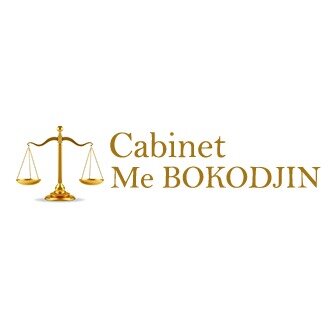Best Financial Services Regulation Lawyers in Lomé
Share your needs with us, get contacted by law firms.
Free. Takes 2 min.
List of the best lawyers in Lomé, Togo
About Financial Services Regulation Law in Lomé, Togo
Financial Services Regulation in Lomé, Togo, primarily governs the conduct and operations of financial institutions and markets within the country. These regulations ensure the stability, integrity, and transparency of the financial system. The main objective is to protect consumers, maintain market confidence, and reduce the risk of financial crises. The Central Bank of West African States (BCEAO) plays a significant role as a regulatory authority overseeing monetary and financial systems in Togo, as part of the West African Economic and Monetary Union (WAEMU).
Why You May Need a Lawyer
There are numerous situations where individuals or businesses might need legal help in the area of Financial Services Regulation in Lomé, Togo. These can include:
- Compliance with regulatory requirements for financial institutions.
- Addressing disputes with financial service providers, such as banks or insurance companies.
- Interpreting complex regulatory frameworks and understanding their implications on business operations.
- Assisting with the launch of new financial products or services to ensure they meet legal standards.
- Defending against regulatory enforcement actions or penalties imposed by authorities.
- Advising on mergers, acquisitions, or restructuring activities within the financial sector.
Local Laws Overview
The financial regulatory landscape in Lomé, Togo is shaped by both regional and local laws. Key laws and regulations relevant to financial services include:
- BCEAO Regulations: As a member of the WAEMU, Togo adheres to regulations set by the BCEAO, which include provisions on monetary policy, supervision of financial institutions, and cross-border banking regulations.
- Banking Law: This law sets forth the requirements for the establishment and operation of banks and financial institutions in Togo, ensuring financial stability and consumer protection.
- Securities Regulations: Governs the issuance, trade, and registration of securities, with the aim to protect investors and ensure a fair trading environment.
- Insurance Code: Outlines the regulatory framework for insurance companies, covering licensing, operations, and consumer protection.
Frequently Asked Questions
What is the role of the BCEAO in Togo's financial regulation?
The BCEAO is responsible for overseeing the monetary policy and ensuring financial stability across the WAEMU region, which includes Togo. It regulates banking activities and ensures the soundness of financial institutions.
Are foreign banks allowed to operate in Togo?
Yes, foreign banks can operate in Togo, but they must comply with local and regional regulations, including obtaining the necessary licenses and adhering to financial and operational standards.
How does Togo's membership in WAEMU affect its banking regulations?
Togo's membership in WAEMU means it follows uniform banking regulations set by the regional authorities, ensuring consistency across member states and facilitating regional economic integration.
What are some common financial products regulated in Togo?
Common regulated financial products in Togo include savings and checking accounts, loans, mortgages, investment funds, and insurance policies.
Are there specific consumer protection laws for financial services in Togo?
Yes, there are consumer protection laws that cover transparency, fair treatment, and the right to information to ensure consumers are protected in financial transactions.
What should I do if I have a dispute with my bank in Togo?
First, address the issue directly with your bank. If unresolved, you may consider seeking legal advice or filing a complaint with the relevant financial supervisory authority.
What licenses are required to start a financial services business in Togo?
Starting a financial service business requires obtaining a license from the Ministry of Finance and complying with BCEAO regulations. Specific licensing depends on the type of financial service offered.
How are financial regulations enforced in Togo?
Financial regulations are enforced by the BCEAO, the Ministry of Finance, and other relevant regulatory bodies which ensure compliance through audits, inspections, and monitoring.
Is there a deposit insurance scheme in Togo?
Yes, Togo, as part of WAEMU, benefits from a regional deposit insurance scheme that offers protection to depositors in case of bank insolvency.
Can cryptocurrency be used in Togo's financial system?
Currently, the use of cryptocurrencies is not widely regulated, and their integration into the formal financial system remains limited, with ongoing discussions at the regional level for potential regulatory frameworks.
Additional Resources
For anyone seeking more information or assistance with Financial Services Regulation in Lomé, Togo, consider contacting the following authorities:
- Central Bank of West African States (BCEAO): The primary financial supervisory body in the region.
- Ministry of Finance of Togo: Oversees financial policy and management within the country.
- West African Economic and Monetary Union (WAEMU): An organization that fosters economic integration and financial regulation coherence among member states.
- Local Law Firms: Many law firms specialize in financial regulatory issues and can provide tailored legal advice.
Next Steps
If you find yourself needing legal assistance in Financial Services Regulation in Lomé, Togo, consider the following steps:
- Identify the specific issue or area of concern you have within financial services regulation.
- Seek a consultation with a legal expert or law firm specializing in financial services law in Togo.
- Gather all relevant documentation and evidence related to your situation to facilitate a comprehensive legal evaluation.
- Discuss potential legal strategies or solutions with your lawyer, keeping in mind the regulatory framework and implications.
- Follow through with any legal advice or actions recommended by your legal counsel to address or resolve the issue effectively.
Lawzana helps you find the best lawyers and law firms in Lomé through a curated and pre-screened list of qualified legal professionals. Our platform offers rankings and detailed profiles of attorneys and law firms, allowing you to compare based on practice areas, including Financial Services Regulation, experience, and client feedback.
Each profile includes a description of the firm's areas of practice, client reviews, team members and partners, year of establishment, spoken languages, office locations, contact information, social media presence, and any published articles or resources. Most firms on our platform speak English and are experienced in both local and international legal matters.
Get a quote from top-rated law firms in Lomé, Togo — quickly, securely, and without unnecessary hassle.
Disclaimer:
The information provided on this page is for general informational purposes only and does not constitute legal advice. While we strive to ensure the accuracy and relevance of the content, legal information may change over time, and interpretations of the law can vary. You should always consult with a qualified legal professional for advice specific to your situation.
We disclaim all liability for actions taken or not taken based on the content of this page. If you believe any information is incorrect or outdated, please contact us, and we will review and update it where appropriate.











